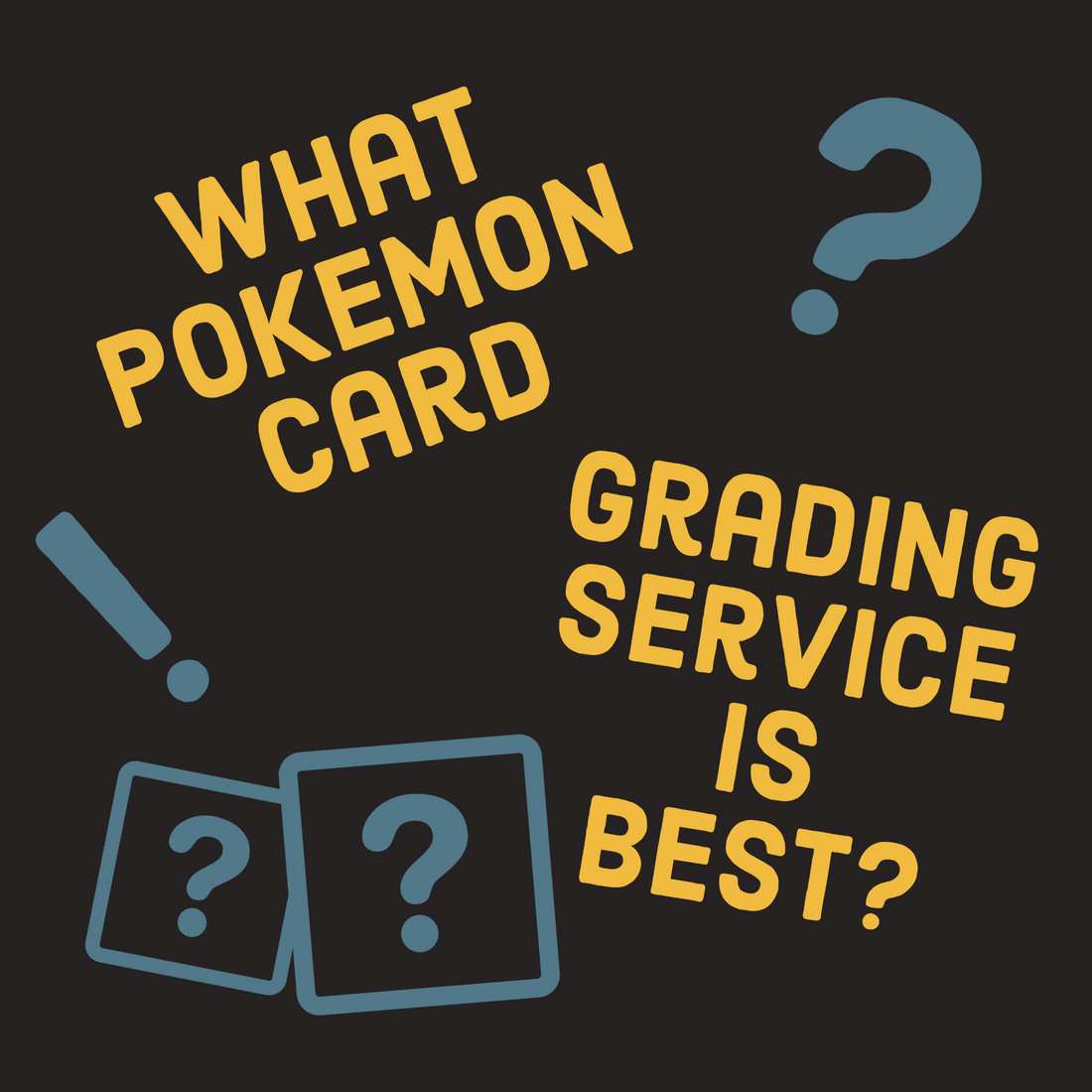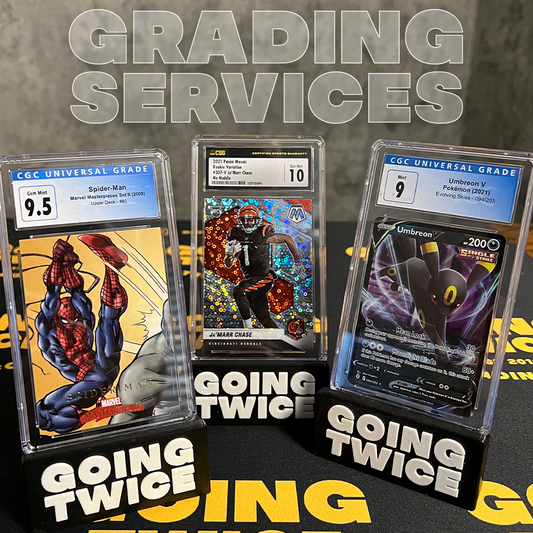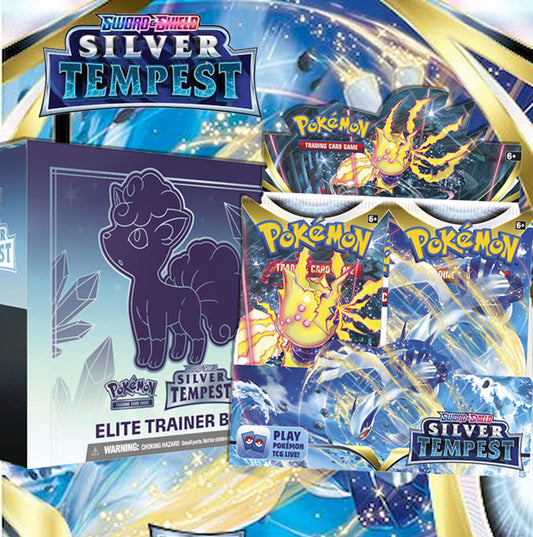
What Pokemon Card Grading Service is Best?
Share
If you are considering grading your Pokemon cards, the choice of which grading service to use is a critical one. Each of the major card grading companies have their own unique features as well as pricing and turnaround times. While the decision of which company to use is ultimately a personal one, it should be a well-informed one. This guide to the top grading companies provides the information you need to make that decision. For each company, we will give a brief history and background, a look at current prices and turnaround times, and other factors to take into consideration. Look for future articles looking at the grading scales for each company in greater depth and how to assess if a card is worth grading.
Basics of Card Grading
Before we dive into the companies themselves, let's clarify a few of the terms and jargon associated with grading costs that we'll discuss for each company.
- Price - the prices are generally listed as a per card fee
- Declared Value - the estimated value of the card after grading (usually limited on each tier level)
- Card minimum - minimum number of cards that must be submitted for a given tier level (i.e., 25 cards to receive bulk pricing)
- Turnaround Time: estimated turnaround from the time your cards are marked as received (can vary by company) to the time they are through encapsulation and ready to return to you, this is usually measured in business days (i.e., 10 days = 2 weeks)
PSA Pokemon Grading Review
PSA (Professional Sports Authenticator) launched in 1991 with a focus on grading sports cards and began grading Pokemon trading cards in mid-1999. The service grew slowly and steadily over the next few years until hitting the milestone of 1 million graded Pokemon cards in 2019.
Basics of PSA Grading Scale
PSA uses a 10 point grading scale with 1 (Poor) being the lowest grade and 10 (Gem-Mint) being the highest. They assess cards on centering, corners, edges, surface, and "eye appeal". There are situations where a card receives no grade including alteration or if it is not an authentic card. In a later article, we'll do a deep dive into the grading scale but you can check out PSA's Grading Standards page for more information.
PSA Submission Types
PSA offers five types of submissions for Pokemon cards. Grading is the authentication and grading of a raw (ungraded) Pokemon card using their 10 point grading scale. Crossover allows you to take a graded card from another grading company and have it evaluated and put into a PSA holder. Review is for cards that have been previously graded by PSA that you feel might be worthy of a higher grade. Reholder is taking a previously graded PSA card and putting it into a new holder. You might choose to do this for a variety of reasons such as wanting a new style of holder (they've changed over the years) or damage to the existing holder. Autograph Duel Grading allows you to authenticate both the trading card and the autograph on the card and receive a grade for each.
PSA Grading Prices and Turnaround Times
The following are the current prices/tiers and their associated turnaround times, you can check PSA's website for the most up-to-date information as it can regularly change. For all tiers, you must be a member of the PSA Collectors Club which is an annual subscription for $99/year.
- Bulk: $18/card, 25 card minimum, declared value or $199 or less, 120 days turnaround
- Value: $30/card, no minimum, declared value of $499 or less, 90-120 days turnaround
- Economy: $50/card, no minimum, declared value of $999 or less, 45-90 days turnaround, includes high res scans of the card
- Regular: $100/card, no minimum, declared value of $1,499 or less, 15-20 days turnaround, includes high res scans of the card and protective sleeve
- Express: $150/card, no minimum, declared value of $2,499 or less, 14 days turnaround, includes high res scans of the card and protective sleeve
- Super Express: $300/card, no minimum, declared value of $4,499 or less, 7 days turnaround, includes high res scans of the card and protective sleeve
- Walk-through: $600/card no minimum, declared value of $9,999 or less, 3 days turnaround, includes high res scans of the card and protective sleeve
If your card is valued about $10,000, you enter the Premium pricing arena where it will cost between $1,000 - $10,000 per card for grading. You can also find pricing for their other services on the PSA Pricing page.
Pros and Cons of Grading Pokemon with PSA
Each company has pros and cons to using their grading services and PSA is no different. Let's break them down:
Pros of Grading with PSA:
- Robust website: PSA has a well-built website with easy-to-use online tools such as their submission page and account interface
- Tools for Collectors: PSA maintains an online Price Guide to assist you in finding the market price for PSA-certified collectibles, an online Pop Report that allows you to search the population of any graded PSA card and verify the certification details of a card by the Certification number listed on the graded card, and the Collectors Vault which allows users to use a single platform to authenticate, grade, research, vault, buy, and sell
- Partnerships: PSA has a partnership with Goldin marketplace that will soon allow customers with access to the Collectors Vault to list items for sale on Goldin and to 'vault' items purchased through Goldin
- Market: Gem-Mint PSA cards tend to maintain a higher market price that other Gem-Mint grades from other companies (note that this can fluctuate and change over time)
Cons of Grading with PSA:
- Limited Grading Scale: there is no half-point grade available between 9 and 10 on their grading scale (no 9.5)
- Turnaround Times: current turnaround times for bulk and economy grading are extremely long and not guaranteed
- High End Cards: the Premium grading prices for high end cards are very high
CGC Pokemon Grading Review
CGC (Certified Guaranty Company) began by grading comic books in 2000 and was widely embraced by collectors. In mid-2020 CGC launched their TCG grading service and has been on the rise ever since. After a mere 18 months in business, CGC hit the 1 million mark for trading cards graded.
Basics of CGC Grading Scale
CGC uses the standard 10 point grading scale with a few notable features. 10 is their highest grade but can be either a Pristine 10 (Gem-Mint) or a Perfect 10 (four perfect 10 sub-grades). 1 (Poor) is their lowest grade and they use half grade increments going up from there. The grades are based on centering, corners, edges, and surface. CGC will assign grades for altered (i.e., inked not unauthentic) but they receive a green label instead of their standard blue one. You can find more information on CGC's Grading Scale information page.
CGC Submission Types
CGC offers standard grading/authentication service for most Pokemon TCGs. CrossOver service will take a card graded with another grading company, evaluate it for CGC grading, and reholder the card if it receives the same or higher grade from CGC. ReHolder service takes an already CGC graded card and puts it in a new CGC holder with no change to the grade.
CGC Grading Prices and Turnaround Times
The following are the current prices/tiers and their associated turnaround times, you can check CGC's website for the most up-to-date information as it can regularly change. For all tiers, you must be a member of the CGC Collectors Society which has different tiers starting with a $25/year rate.
- Bulk: $15/card, 25 card minimum, max declared value of $250, 30 day turnaround
- Economy: $25/card, no minimum, max declared value of $500, 20 day turnaround
- Standard: $35/card, no minimum, max declared value of $1,000, 10 day turnaround
- Express: $70/card, no minimum, max declared value of $10,000, 5 day turnaround
- WalkThrough: $150/card, no minimum, max declared value of $50,000, 3 day turnaround
- Unlimited WalkThrough: $150/card + 1% fair market value, no minimum, unlimited max declared value, 3 day turnaround
CGC also offers the additional option of getting Sub-Grades where the card is assigned separate grades for centering, corners, edges, and surface in addition to its overall grade. This is available for an extra $15/card. Cards can also receive an error designation or pedigree added to the label for an extra $5/card.
Pros and Cons of Grading Pokemon with CGC
Each company has pros and cons to using their grading services and CGC is no different. Let's break them down:
Pros of Grading with CGC:
- Speed & Cost: CGC has competitive prices and very fast turnaround times compared to the other major grading services
- Robust Website: CGC has a robust website with easy to use submission forms and account access
- Tools for Collectors: CGC manages a database of CGC-certified cards allowing users to look cards up by certificate number or the QR code on the label, the CGC Pop Report tracks the population numbers for CGC graded cards and while not complete is being expanded all the time, and the CGC Registry allows collectors to keep track of their CGC graded collection, share and interact with other collectors, and have fun competing with other collectors around the world for bragging rights to the 'best collection'.
- Partnerships: CGC has recently partnered with PWCC Marketplace to allow collectors to submit raw cards through PWCC to be graded with CGC and then have then go up for auction with PWCC.
- Grading Scale: the use of sub-grades, half-point grades, and the Pristine vs Perfect 10 grading scale allows for more range in the grading scale
Cons of Grading with CGC:
- New Kid on the Block: while CGC receives thousands of Pokemon cards very month for grading, they are still relatively new on the scene and have had the hiccups that one might expect from a new company
- Perceived Value: CGC graded cards (with the exception of Perfect 10s) are still a bit behind the market value for PSA graded cards
BGS Pokemon Grading Review
BGS (Beckett Grading Service) started in 1999 grading sports cards and expanded to include Pokemon in 2001.
Basics of BGS Grading Scale
BGS uses the standard 10 point grading scale descending in half point increments down from 10 (Gem-Mint) to 1 (Poor). Their standard is to include sub-grades in their grading process but it is possible to get cards without them for a slight price-break. The grade is based on centering, corners, edges, and surface.
BGS Submission Types
BGS offers traditional card grading/authentication with or without sub-grades. They also offer a dual service (similar to PSA) for grading and authenticating autographs on cards. Regrading is available with minimum grade stipulations that allow you to regrade the card with BGS only if it will reach a minimum grade or higher.
BGS Grading Prices and Turnaround Times
The following are the current prices/tiers and their associated turnaround times, you can check BGS's website for the most up-to-date information as it can regularly change.
- Collectors' Special w/ sub-grades*: $22/card, 10 card minimum, 30-60 day turnaround
- Collectors' Special w/o sub-grades*: $16-18/card, 20-40 card minimum, 30-60 day turnaround
- Economy w/ sub-grades: $25/card, no minimum, 25-45 day turnaround
- Standard 2/ sub-grades: $40/card, no minimum, 10-20 day turnaround
- Express w/ sub-grades: $100/card, no minimum, 5-10 day turnaround
- Premium w/ sub-grades: $200/card, no minimum, 2-5 day turnaround
*Limited Time Offers
Pros and Cons of Grading Pokemon with BGS
Each company has pros and cons to using their grading services and BGS is no different. Let's break them down:
Pros of Grading with BGS:
- Cost: BGS has competitive prices especially for sub-grades, the other grading companies do not come close to the same price point
- Rare Card Grading: BGS offers grading for some cards that other companies do not such as certain non-english sets and big cards (oversized box toppers and promos)
- Tools for Collectors: BGS manages the Beckett Marketplace where collectors can buy and sell cards and other collectibles, the BGS Pop Report tracks the population numbers for BGS graded cards, and the Beckett Online Price Guide allowing collectors to valuate their collection or see the value of cards they are looking to purchase.
- Black Label: one of the most valuable grades that a card can achieve is the coveted Beckett Black Label which is 10s on all 4 sub-grades, essentially perfect in every way
- Grading Scale: the use of sub-grades and half-point grades
- Low card minimums and no declared value limits
Cons of Grading with BGS:
- Website: the BGS website is not as built-out or developed as their competitors and is difficult to navigate
- Turnaround Times: BGS has improved their turnaround times in the past 6 months but they are still relatively slow
Conclusion:
Each of the major three grading companies have their pros and cons and how you weigh them will depend on your budget, desired turnaround time, interest in extra features such as sub-grades or third-party partnerships, and personal preference. You may want to start out trying each of the companies or get your feet wet by having only a few cards graded. Due to submission card limits, this may mean that you pay a premium to only submit a few cards or you can consider using an authorized dealer associated with the grading services. Going Twice is an Authorized Dealer with CGC and you can find out more information about grading with us on our Grading Services page.



